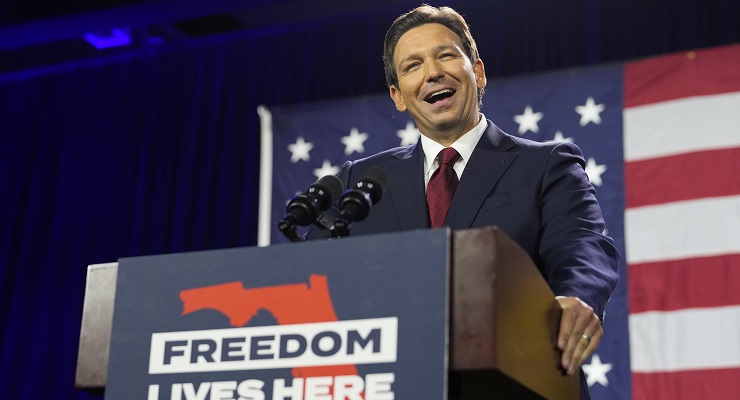
Last month, Florida Governor Ron DeSantis moderated a panel on the importance of “truth”.
DeSantis opened with a broadside against mainstream media outlets: “When you’re knowingly putting out false information and, indeed, I’d say these companies are probably the leading purveyors of disinformation in our entire society right now, there needs to be an ability for people to defend themselves … through a private right of action.”
DeSantis’ call to make it easier to sue the media for “false information” is part of a larger Republican revolt against the 1964 Supreme Court New York Times v Sullivan decision, which sets a very high bar for when public figures and officials can successfully sue for defamation. They must show, by clear and convincing evidence, that the defamatory statement was made either with knowledge of its falsity or reckless disregard as to its truth or falsity, the “actual malice” test.
According to its critics, Sullivan has allowed a biased mainstream media to slander conservatives and Republicans with impunity. The backlash has received legal support from conservative Supreme Court justices Clarence Thomas and Neil Gorsuch, who have signalled a willingness to overturn Sullivan.
But there is every reason to think that overturning Sullivan would cause massive collateral damage to political speech on both sides of the partisan divide. Worse yet, overturning Sullivan would not only undermine liberty, equality and democracy in the United States. It would likely also do so in democracies around the world where these freedoms are already under systematic threat.
A legal shield
In fact, Sullivan is one of the most successful exports of US free speech doctrine, which has inspired judges across the globe to provide journalists and dissidents with a legal shield against censorial politicians and government officials.
The Republican efforts to overturn Sullivan might seem especially self-damaging. Surely those benefiting the most from the First Amendment’s current protection for peddling falsehoods are “Make America Great Again” election deniers, QAnon enthusiasts and other right-wing conspiracy theorists.
It perhaps shouldn’t be a surprise that Republicans’ attacks on speech-protective defamation laws and on “news outlets engaged in bad behaviour” are highly selective. After all, many of them defend Fox News despite recent evidence that several of its anchors knowingly spread false information about the 2020 presidential election with the knowledge of senior executives. Ironically, Sullivan is Fox’s best hope of getting off the hook — although Fox’s gross journalistic malpractice may satisfy even Sullivan’s demanding standards.
Let them dig
So if Republicans in favour of eroding Sullivan are akin to a person trapped in a hole, why shouldn’t Democrats hand them a shovel in the shape of bipartisan support? The pre-Sullivan history shows that more permissive libel laws will predictably be (ab)used by those in power, disproportionately silencing minority views and groups. Moreover, democratic self-government is weakened when “we the people” are deterred from vigorously criticising our elected representatives for fear of defamation lawsuits, since even suits that are ultimately unsuccessful impose great tangible and intangible burdens.
In Sullivan, an Alabama official won an enormous civil damages award (US$500,000) against civil rights leaders, as well as The New York Times, for an ad that described Alabama’s persecution of peaceful civil rights activists. The then permissive libel laws imposed strict liability and substantial damages for even inadvertent, inconsequential inaccuracies. Southern officials took advantage of these laws to institute multiple libel lawsuits against civil rights activists and media outlets with the specific goal of silencing their critics.
Recognising that Sullivan’s tightened defamation standards would allow some minor false statements about officials to escape punishment, the Supreme Court also recognised that, pre-Sullivan, too many true statements were punished or chilled to the detriment of the civil rights cause and to democracy more broadly. This calculus still holds true today.
In Florida, lawmakers have introduced a bill that would make it much easier to sue for defamation by, among other things, limiting the protections for journalists and establishing that “an allegation that the plaintiff has discriminated against another person or group because of their race, sex, sexual orientation or gender identity constitutes defamation per se”. Accusing someone of such discrimination would thus automatically be deemed damaging to their reputation, without needing to prove the contextual factors that are usually required to demonstrate harm in any particular case — including in the obverse case, involving false statements that someone has made accusations of this type of discrimination.
These proposals target journalists and the media and disadvantage the liberal-progressive side of divisive culture war debates about race, sexual orientation and gender identity. The Florida bill follows the playbook of Donald Trump who as president threatened to “open up libel laws”.
By 2018 this rhetoric had convinced more than half of Republicans that the media was “the enemy of the people” and a poll showed that 43% of Republicans believed Trump “should have the authority to close news outlets engaged in bad behaviour”. Such disastrous outcomes would be facilitated by weakening Sullivan’s protective shield for government critics.
Regardless of whose political ox may be gored in any particular situation, the overall impact of weakening Sullivan would be to mute critics of government officials and policies. One only has to look at European democracies to find alarming examples of how the powerful can exploit fewer speech-protective defamation laws to silence criticism and “insults”. In 2022, the European Commission proposed a directive to counter the rising threat of strategic lawsuits against public participation (“SLAPPs”), which are used to intimidate and silence journalists and human rights defenders, even when the suit is meritless.
SLAPPing down critics
In 2021, French President Emmanuel Macron successfully sued a billboard owner for depicting Macron as Hitler on a poster protesting COVID-19 restrictions. In Italy, the famous anti-mafia journalist Roberto Saviano has been sued by no less than three members of the current right-wing government — including Prime Minister Giorgia Meloni — who have accused him of defamation for harsh criticism over their policies on migrants, Russia and the mafia. In February 2021, Spanish rapper Pablo Hasél was jailed for nine months for his lyrics and tweets that were not only “glorifying terrorism” but also “insulting” the royal family and the police.
In the UK, rich, powerful and often nefarious individuals have used expensive lawyers as “hired guns” and systematically sought to exploit the country’s plaintiff-friendly libel laws to silence critics with SLAPPs. Those who claim that their reputations have been unfairly impugned include Yevgeny Prigozhin, the Russian oligarch who runs the mercenary Wagner Group, which is currently fighting in Ukraine.
While the US is an outlier when it comes to the protection afforded to free speech, it is a little-known fact that Sullivan has played an influential role in strengthening the global legal protection of journalists and the media.
In Argentina, the Supreme Court has explicitly referred to Sullivan’s actual malice test in several cases where journalists or media outlets faced defamation suits from public officials. A lower court barred former Argentine president Cristina Fernández de Kirchner from successfully suing a journalist who accused her of corruption. (Fernández was subsequently convicted of fraud in December 2022.)
In Brazil, the Supreme Court used the actual malice test to declare a media law enacted during the military dictatorship unconstitutional. Courts in India, Guatemala, Mexico, Ghana, Kenya and the Economic Community of West African States (ECOWAS) Court of Justice, with jurisdiction over 15 West African countries, have also referred to Sullivan in decisions upholding the right to free speech against challenges from politicians, public officials, judges and vague laws threatening press freedom.
Despite the globalisation of Sullivan, the freedoms of speech and media are in decline. A recent UNESCO study concluded that 80% of the countries in the world criminalise defamation and that both criminal and civil defamation laws are being expanded in order to punish and threaten independent media and dissidents.
The past decade has seen a dramatic increase in the number of journalists imprisoned on charges of false news. In 2012, the Committee to Protect Journalists recorded one journalist imprisoned for such charges. In 2021, the number had risen to 51, with only a slight drop to 39 in 2022, which still marks the second-highest number of journalists imprisoned for false information since records began.
Should Sullivan be overturned, the bulwark of liberty that provides Americans an unparalleled freedom to criticise the powerful will be breached. That would also set a precedent for the rest of the world for unraveling hard-won limits on censorial power that are essential to individual freedom, democratic accountability and resisting resurgent authoritarianism.
The price would be high for democracy, both at home and abroad.










Those who decry “cancel culture” are the activity’s main supporters. The sooner someone introduces the word “freedom” into a political discussion, the less they care for it. Those who hate “woke anowflakes” are the most easily offended. Read my lips; hear my words; believe the opposite.
I agree in the broad, but there should be at least some acknowledgement of particularly poor media behaviour, especially in Australia.
This week’s episode of ABC Media Watch has some great examples – the hysterical and inaccurate representation of the proposed super reform, and separately the broadcasting of false allegations by a local radio station for a full day with only piecemeal correction late in the afternoon.
I don’t agree with the actions of DeSantis and others, but I can understand how they formed their views in the current media landscape. Also don’t forget that the broad left in Aus are (justifiably) calling for a royal commission into News Corp, which the right would also claim to be an attack on the media.
The right would claim a great many risible falsehoods. May I suggest we refrain from tip-toeing on eggshells in a doomed effort to avoid their inevitable rabid screeching.
How far we have sunk, how utter the victory of self-interest, when Justice Clarence Thomas, an African American, is desirous of changing the very law that served to give his people a voice and end segregation in the ‘Sixties.
Nothing new.., the rich powerful, unscrupulous, uncivilised, selfish, especially media maggoty misfits, want to tighten the grip on the nuts of actual democratic freedoms. We are progressively squashed and reduced by newer technology, and are electronic peasants. Surely no more, and thus slavery? Mass education gave the old “masses” enough to fuel smartassery and insolence, quite healthy in a world of overbearing corporate ani. If a Putrid Mussolino type like the odious De Santis( De Luded, De Graded) can threaten us all, it’s a sad day and a poor outlook.
Just because the USA may rescind a law does not mean other nations will follow. Example: Roe vs Wade.